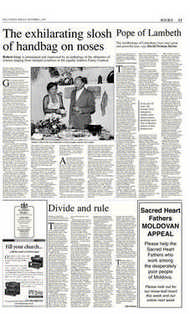Page 3, 4th November 2005
Page 3

Report an error
Noticed an error on this page?If you've noticed an error in this article please click here to report it.
Tags
Share
Related articles
Pro-life Group Accuses Bbc Of Euthanasia Bias
Church Launches Struggle To Kill Off Euthanasia Bill
Assisted Suicide Bill Wrecked By The Lords
People Are Animals Too, Until It Comes To Rights
Help Us Stop Parliament Legalising Assisted Suicide
in coverage of Joffe Bill
BY DAVID V BARRETT
A GROUP of MPs has accused the BBC of bias over its reporting of the debate over the coming euthanasia Bill.
Forty MPs have signed an Early Day Motion objecting to alleged one-sided proeuthanasia coverage of Lord Joffe’s proposed reintroduction of his Assisted Dying for the Terminally Ill Bill.
The MPs, who include a number of Catholic backbenchers – Jim Dobbin and Geraldine Smith, both Labour, and Conservatives Ann Widdecombe, Edward Leigh and Julian Brazier, among others – claim that the BBC’s coverage of the issue has been one-sided, and has not represented the opposing view. The BBC quoted Lord Joffe, saying that Britain should follow the example of the state of Oregon in the USA, where assisted suicide is legal, and where one in every 700 terminally ill patients chooses assisted dying rather than palliative care.
The MPs point out that no other state has followed Oregon’s example, and that 12 states have specifically rejected it, “citing in debates the deleterious effects experienced there”. This should have been made clear on the programme, they said.
The MPs also criticise BBC Radio Five Live for interviewing a member of the Voluntary Euthanasia Society who has multiple sclerosis and wants physician-assisted suicide, without also interviewing someone with an alternative view.
The alleged BBC bias is nothing new, say the MPs who signed the Early Day Motion. They claim that in 2003 and 2004 “the BBC contravened its Charter by persistently supporting the campaign to legalise euthanasia”.
They also claim that the BBC only interviews the disabled or the terminally ill if they are in support of euthanasia.
The MPs are calling on the Solicitor General, a senior government law officer, “to require the BBC to abide by its charter and to show impartiality on all issues of public policy”.
Mr Dobbin has written to Mark Thompson, directorgeneral of the BBC and a Catholic, “protesting about the biased coverage so far given by the BBC on the Lord Joffe Bill” and asking him to take action.
The spokesman for the BBC has rejected allegations of bias. He said: “The BBC coverage of this debate was balanced, rigorous and informative.” Referring to the Five Live programme he said: “First, our correspondent explained the background to Lord Joffe’s Bill and rehearsed the arguments for and against voluntary euthanasia and assisted suicide.” The woman with multiple sclerosis, he said, was challenged by the interviewer with a quotation from Anglican leader Dr Rowan Williams: “Life is a gift from God which we cannot treat as a possession of our own to throw away.” Another programme, the BBC spokesman said, had an interview with Anglican Bishop Tom Butler of Southwark “who is of course opposed to voluntary euthanasia and assisted suicide”. And the Radio 4 Today programme featured a discussion between Lord Joffe and Anglican Bishop Richard Harries of Oxford, who opposes the proposed Bill.
“Both were granted plenty of time in which to put forward their views,” he said.
But in his letter to the director-general Mr Dobbin accuses the BBC of telling scare stories of people dying in agony, or of choking to death. It is wrong of the BBC, he said “to promote medieval concepts of medicine that are being used by an unscrupulous lobby in order to frighten the public”.
This will be Lord Joffe’s fourth attempt to get his bill on to the statute books. If the Bill became law doctors would be able to provide lethal drugs for patients to administer to themselves. This is known as physicianassisted suicide rather than voluntary euthanasia, where the doctor hastens death at the patient’s request.
“I think palliative care is the right answer for the overwhelming majority of cases,” said Lord Joffe. “I strongly support the case for very significant expansion of Government funding for hospice and the palliative care movement.” What he wants to do, he says, is to provide an alternative for those few who do not want palliative care.
“I respect the religious views of those who oppose the Bill,” he said. “I respect their right to make a decision in their own lives, but they have no right to impose their views on others who do not agree with them.” He also said that religious leaders “haven’t yet caught up with the beliefs of today’s society, both secular and religious. The churches do in many cases lag behind the people,” he said.
He claims that his proposed bill represents the views of 80 per cent of the population. Jim Dobbin MP disputes this, saying that in a recent survey 70 per cent of doctors were opposed to any form of voluntary euthanasia.
Mr Dobbin also disputes the distinction between assisted suicide and voluntary euthanasia. “I don’t think there’s any difference between the two,” he said.
Lord Joffe said he had modified his original Bill significantly, making many amendments to it. “I’m listening carefully, and learning a lot,” he said.
But Mr Dobbin disagreed. “It’s all very clever wording, but in the end it’s the same Bill,” he said. “It’s achieving the same end. I feel his aim is euthanasia. That’s where he’s heading. This is opening the door.”
blog comments powered by Disqus

















